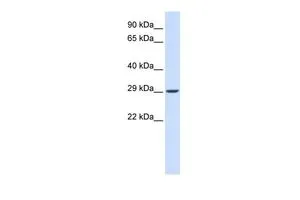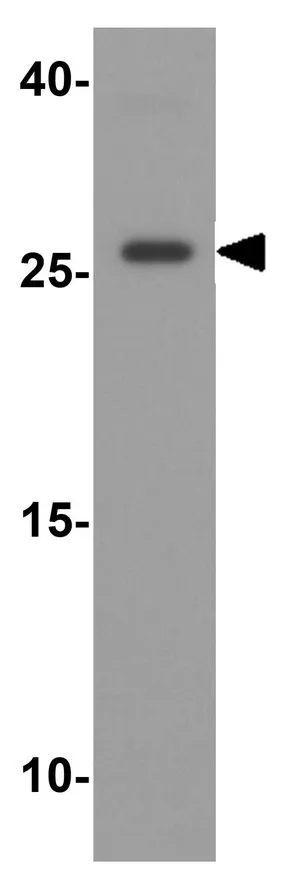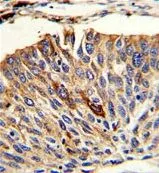
WB analysis of human fetal muscle tissue using GTX45696 VTI1A antibody at 0.2-1μg/ml.
VTI1A antibody, N-term
GTX45696
ApplicationsWestern Blot
Product group Antibodies
ReactivityHuman
TargetVTI1A
Overview
- SupplierGeneTex
- Product NameVTI1A antibody, N-term
- Delivery Days Customer9
- Application Supplier NoteWB: 0.2-2.5 ug/ml. *Optimal dilutions/concentrations should be determined by the researcher.Not tested in other applications.
- ApplicationsWestern Blot
- CertificationResearch Use Only
- ClonalityPolyclonal
- Concentration0.5-1 mg/ml
- ConjugateUnconjugated
- Gene ID143187
- Target nameVTI1A
- Target descriptionvesicle transport through interaction with t-SNAREs 1A
- Target synonymsMMDS3, MVti1, VTI1RP2, Vti1-rp2, vesicle transport through interaction with t-SNAREs homolog 1A, SNARE Vti1a-beta protein, vesicle transport v-SNARE protein Vti1-like 2
- HostRabbit
- IsotypeIgG
- Protein IDQ96AJ9
- Protein NameVesicle transport through interaction with t-SNAREs homolog 1A
- Scientific DescriptionThe protein encoded by this gene is a member of the family of soluble N-ethylmaleimide-sensitive fusion protein-attachment protein receptors (SNAREs) that function in intracellular trafficking. This family member is involved in vesicular transport between endosomes and the trans-Golgi network. It is a vesicle-associated SNARE (v-SNARE) that interacts with target membrane SNAREs (t-SNAREs). Polymorphisms in this gene have been associated with binocular function, and also with susceptibility to colorectal and lung cancers. A recurrent rearrangement has been found between this gene and the transcription factor 7-like 2 (TCF7L2) gene in colorectal cancers. Alternative splicing results in multiple transcript variants. [provided by RefSeq, Dec 2015]
- ReactivityHuman
- Storage Instruction-20°C or -80°C,2°C to 8°C
- UNSPSC41116161




